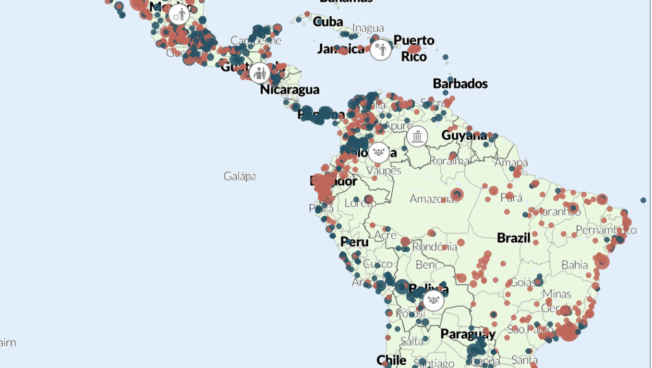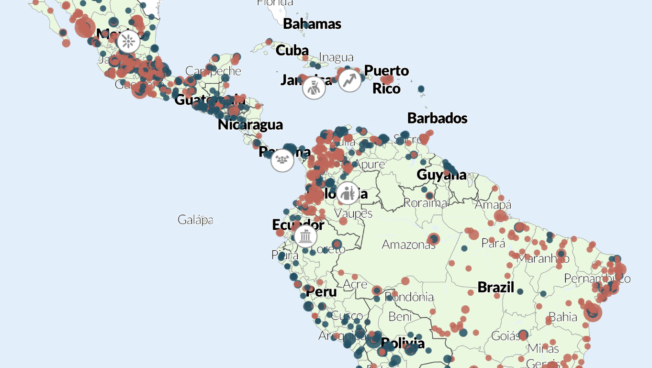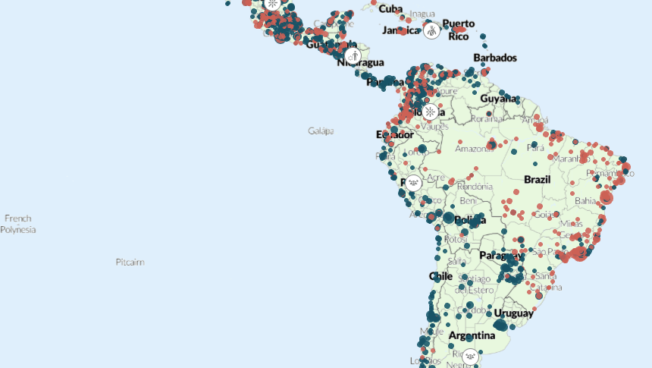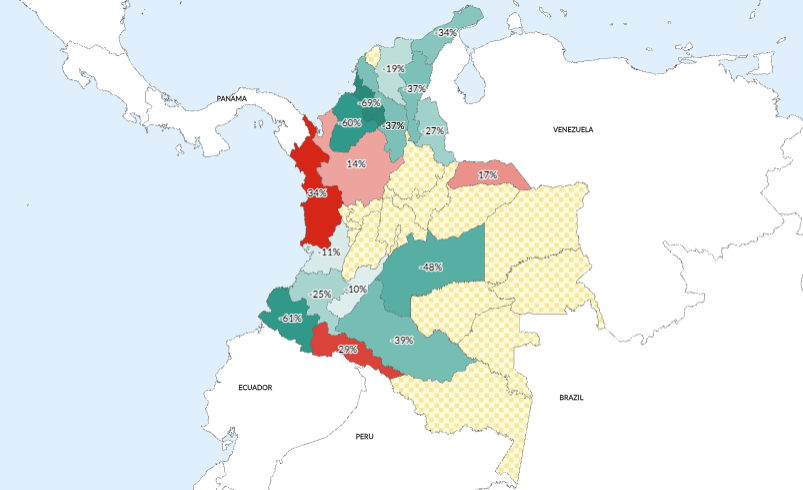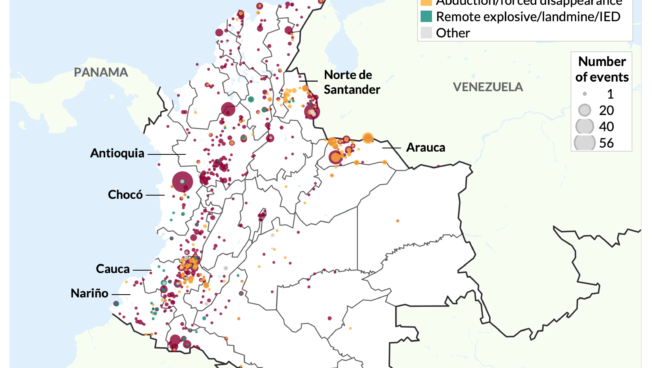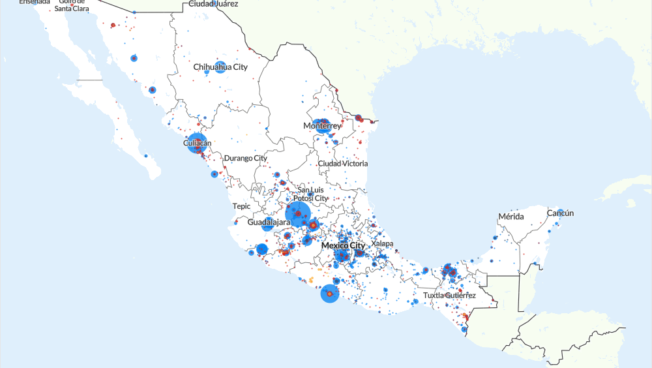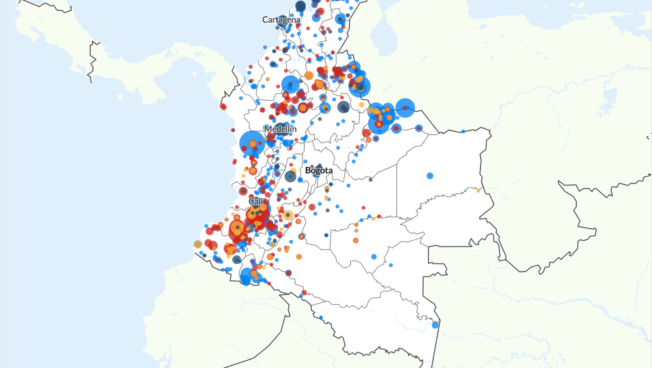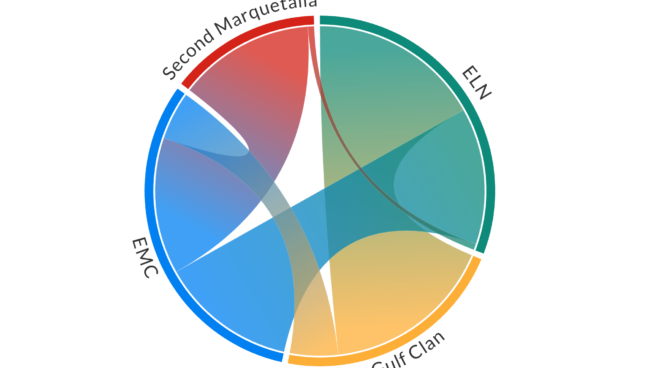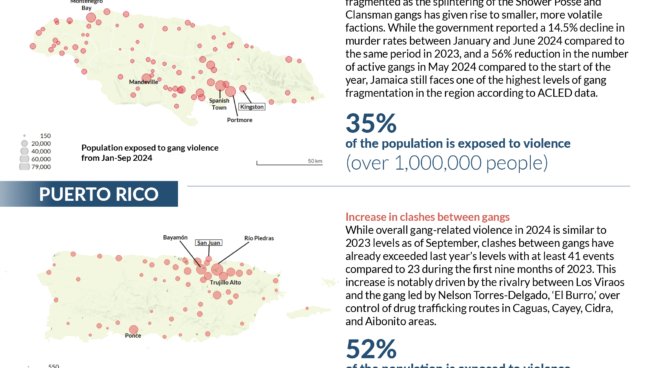Find all ACLED data and analysis for Latin America & the Caribbean below.
The Latin America & the Caribbean dataset is updated every Monday through the most recent Friday.
Spotlight
Mexico →
Curated Data
This file contains all political violence events, demonstration events, and strategic developments recorded in Latin America & the Caribbean from the beginning of ACLED coverage to the present. Please note that historical coverage may vary by country. A full list of country-year coverage is available here.
For an explanation of how ACLED codes and categorizes data, see the ACLED Codebook. For more information, see our Resource Library. Guides specific to Latin America & the Caribbean include:
Latin America and the Caribbean ( 20 June 2025 )
Regional Overviews
Our monthly analysis briefs break down the latest data on political violence and protest trends, highlighting potential early warning signs for closer monitoring.
Latin America & the Caribbean Analysis
REPORT | 17 February 2025
Civilians in Colombia face less deadly — but more pervasive — violence during Petro’s presidency
The start of the year in Colombia was marked by a rekindling of armed groups’ confrontations in several settings, notably in the Catatumbo region of Norte de Santander.
Regional Data Collection Partners
ACLED partners with a wide range of organizations to collect information in hard-to-access contexts and integrate thematic, regional, and country-level expertise into our data collection program. Click through the list to learn more about our partners in Latin America & the Caribbean.

Caracas Mi Convive & Monitor de Victimas

Caracas Mi Convive & Monitor de Victimas
Caracas Mi Convive works to prevent and reduce violence in the most vulnerable communities of Libertador municipality in Caracas Venezuela. To do this, they promote community-driven development projects, evidence-based strategies, and local leaderships to create environments of peace and coexistence. All of their violence prevention projects are designed to be replicated and become sustainable and effective citizen security policies.
Coverage: Venezuela
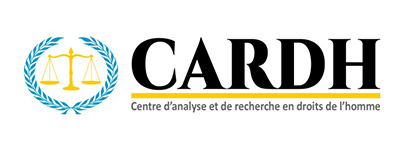
Centre d'analyse et de recherche en droits de l'homme (CARDH)

Centre d'analyse et de recherche en droits de l'homme (CARDH)
The Centre d'analyse et de recherche en droits de l'homme (CARDH) is a non-profit Haitian civil society organization with consultative status with the United Nations (Economic and Social Council). Its mission is to contribute to the respect and promotion of the rights and principles postulated by the Universal Declaration of Human Rights (UDHR) as a condition for achieving democracy, the rule of law, sustainable development, good governance, poverty eradication and the attainment of the Sustainable Development Goals (SDGs). In order to achieve its objectives, the ACHR bases its actions on six pillars: i) research; ii) capacity building and partnership; iii) promotion and advocacy; iv) monitoring and defence; v) support for democratic transition; vi) contribution to international and regional human rights protection systems.
Coverage: Haiti
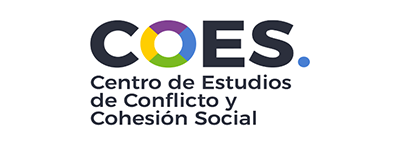
Centre for Social Conflict and Cohesion Studies (COES)

Centre for Social Conflict and Cohesion Studies (COES)
The Centre for Social Conflict and Cohesion Studies (COES) is a research center that brings together a group of high profile academics from multiple disciplines to study social conflict and cohesion in Chile. The Centre’s objective is to contribute to the understanding of social cohesion and conflict through research that informs public policy and social dialogue, as well as raising general public awareness about these issues. COES focuses on four research lines that we consider to be of utmost relevance to the problems of social conflict and cohesion: the Socioeconomic Dimensions of Conflict; Group and Individual Interactions; Political and Social Conflict; and Geographies of Conflict.
Coverage: Chile

Dialogos

Dialogos
DIALOGOS is a Guatemalan think tank that promotes training, research, and innovation based on data and evidence among public authorities, members of civil society organizations, and journalists in order to address and make decisions on social problems affecting Guatemalans and the countries of Northern Central America.
Coverage: Guatemala, El Salvador, Honduras
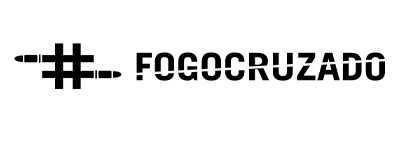
Fogo Cruzado

Fogo Cruzado
Instituto Fogo Cruzado or Crossfire Institute in English, is a non-profit organization that, since 2016, aims to track and end gun violence in Brazilian cities. Its team monitors gun violence in real-time, conducts data analysis to identify trends and inform the public, and partners within civil society stakeholders to develop participatory and democratic coalitions that pressure authorities to respect human rights and end gun violence. Fogo Cruzado has broken the State’s monopoly on armed violence data and now produces 40 exclusive indicators of armed violence in 49 Brazilian cities that are home to nearly 21 million residents. The data have been used to enact policy changes and have become essential for lawmakers, law enforcement agencies, the media, academics, and activists. Most importantly, the real-time data is available in an app that is used by citizens to stay informed about armed violence and avoid being caught in the crossfire. Fogo Cruzado collects data on individual incidences of armed violence through OSINT sources, such as social media, as well as police sources, the news media, trusted local partners, and app users. All data is verified by a team of analysts before it is published by Fogo Cruzado. Each incidence of armed violence is aggregated in a database with additional details such as geolocation, timestamp, injuries, deaths, and presence of law enforcement agents.
Coverage: Brazil
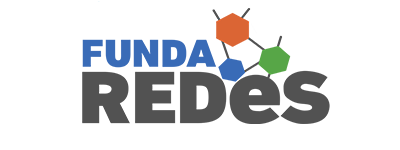
FundaRedes

FundaRedes
Fundaredes is a Venezuelan NGO that monitors, documents and raises awareness about human rights violations and crime rates in Venezuela's border states. It alerts about the actions of irregular armed groups in states such as Falcón, Zulia, Táchira, Apure, Amazonas, and Bolívar. Fundaredes conducts assessments of the border context, identifying its conditioning factors and carrying out prospective situational analyses that enable it to visualize scenarios and recommend preventive and corrective actions regarding violations or threats to human rights and freedom in the Venezuelan border.
Coverage: Venezuela

InSight Crime

InSight Crime
InSight Crime is a think tank and media organization that seeks to deepen and inform the debate about organized crime and citizen security in the Americas by providing regular reporting, analysis, data, investigation, and policy suggestions on how to tackle the multiple challenges they present.
Coverage: Regional

Instituto de Estudios para el Desarrollo y la Paz (INDEPAZ)

Instituto de Estudios para el Desarrollo y la Paz (INDEPAZ)
The Instituto de Estudios para el Desarrollo y la Paz (INDEPAZ) is an NGO made up of people who have built collaborative relationships to promote peace in Colombia. It also monitors, from the Human Rights, Peace and Conflict Observatory, the conflict in Colombia, including the reorganization of armed groups, paramilitary activities, attacks against civil society, and stories of resistance.
Coverage: Colombia

Mexico Violence Resource Project (MVRP)

Mexico Violence Resource Project (MVRP)
The Mexico Violence Resource Project (MVRP) is a collaborative, hybrid effort that publishes original research on Mexican security issues. The project provides both innovative datasets and insightful analysis covering a range of topics from organized crime to human rights. With an emphasis on local perspectives and evidence gathered through fieldwork, the initiative provides policymakers, journalists, and scholars the tools to develop deeper understandings and smarter solutions.
Coverage: Mexico
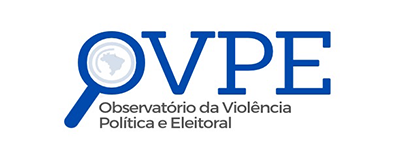
Observatory of Political and Electoral Violence (OVPE)

Observatory of Political and Electoral Violence (OVPE)
The Observatory of Political and Electoral Violence (Observatório da Violência Política e Eleitoral – OVPE, in Portuguese) is a publication produced by the Electoral Research Group of the Federal University of the State of Rio de Janeiro (GIEL/UNIRIO) on the dynamics and impact of violence in Brazilian democracy.
Coverage: Brazil
Show more (5)

